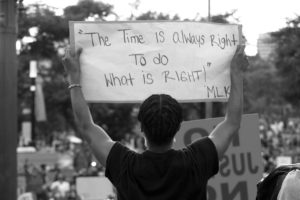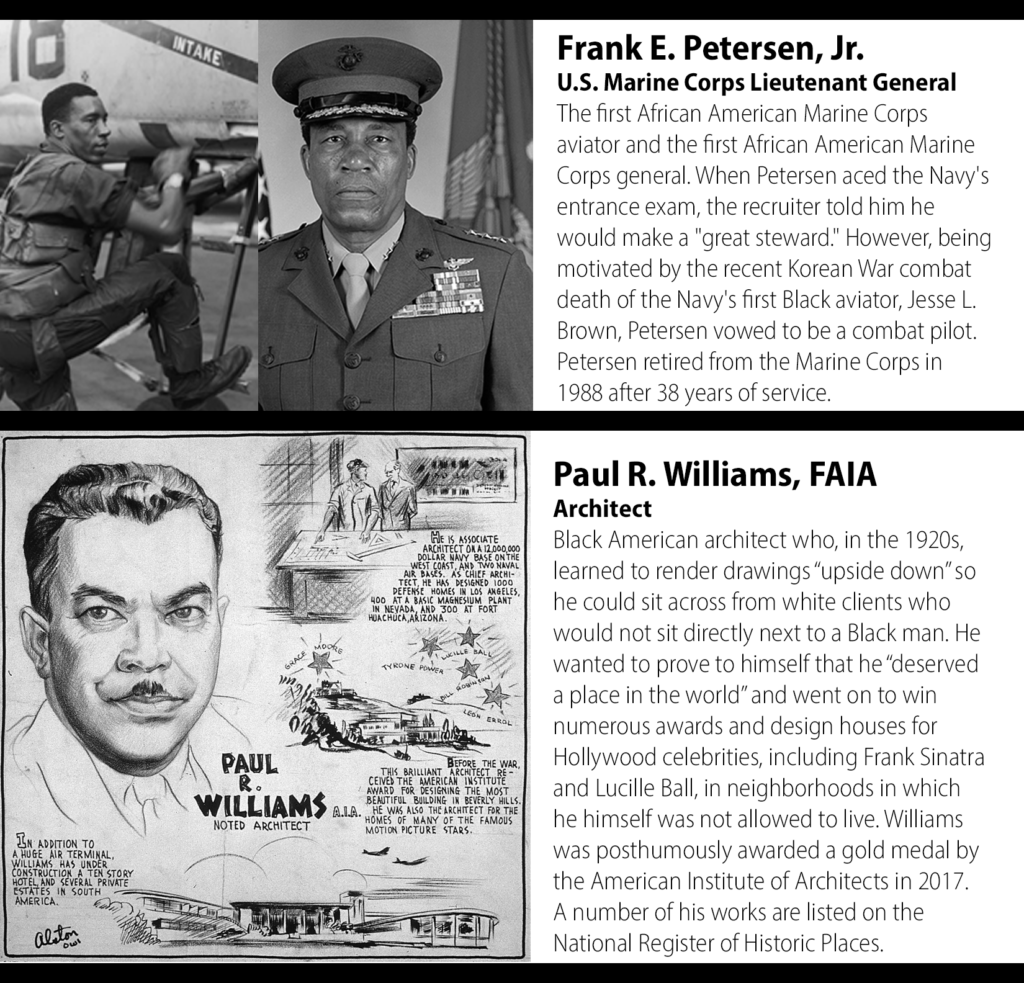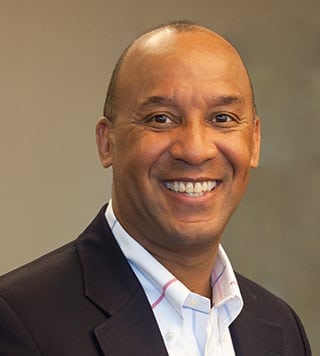Interview with CEO Greg McCray
In honor of Black History Month, we invited CEO Greg McCray to sit down for a chat to learn about his personal history and what this month’s observance means to him. Following is a transcript of the conversation, lightly edited for readability and clarity.
This interview was conducted by FDH’s senior director of marketing strategy and commercial operations, Nadia Mulaire.
Nadia: Greg, thanks for agreeing to share your personal story with us.
Greg: Thanks for the invitation!
Nadia: Why don’t we start with where you were born and where you spent your formative years?
Greg: So I was born in Davenport, Iowa – on the Mississippi River in an area called the Quad Cities, which refers to two cities in Iowa and two cities in Illinois connected by bridges. It was a very industrialized area known for manufacturing farm and heavy construction equipment, companies like John Deere, Caterpillar, etc. However, outside the cities, it was all rural farmland. I grew up on a farm where my family grew corn, soybeans, oats, and raised hogs and cattle.
Nadia: What was your impression of the world and society like at that time, in that geographic area?
Greg: I grew up during the civil rights era of the 60s and 70s, which, as you know, was a turbulent time in America. My parents were very involved in the civil rights movement. And while I went to all-white public schools, my family attended an all-Black church in the city. It was a very divided life…and America was very divided at that time.
Throughout my childhood, I was extremely aware of racism. I was called the N-word on my first day of kindergarten. That word and others like it were hurled at me throughout my school years and even into my working career. Surprisingly, it wasn’t always from strangers or fellow students; it also came from teachers or other white people in positions of authority. While I had a large support group of family and relatives, other Blacks from the Quad Cities often looked upon me as an outsider, as they only saw me on Sundays and knew I lived in the “white area.”
 There were also many unwritten rules. For example, Blacks and Hispanics weren’t allowed to live in certain neighborhoods or work in certain jobs; some stores wouldn’t let Black people try on clothes as some whites actually believed the color would wear off on them; the all-white police force was overly aggressive towards Blacks and Hispanics; I could go on. In general, acts of racism were much more overt then. However, there was a lot of civil rights activism with marches and protests – largely focused on fairness and equality in jobs and housing. Blacks could always vote in Iowa, so, over time, there were positive changes in city/county governments, and those “unwritten” rules were gradually eliminated.
There were also many unwritten rules. For example, Blacks and Hispanics weren’t allowed to live in certain neighborhoods or work in certain jobs; some stores wouldn’t let Black people try on clothes as some whites actually believed the color would wear off on them; the all-white police force was overly aggressive towards Blacks and Hispanics; I could go on. In general, acts of racism were much more overt then. However, there was a lot of civil rights activism with marches and protests – largely focused on fairness and equality in jobs and housing. Blacks could always vote in Iowa, so, over time, there were positive changes in city/county governments, and those “unwritten” rules were gradually eliminated.
Nadia: A very interesting moment in history to be coming of age in. How do you think growing up at that time in Iowa shaped you?
Greg: Well, let me share two stories from my school days that together had a big impact. First, back when I was in junior high, I was staying at the home of a good friend who was white – I’d known him and his family for years. One afternoon, at one point when my friend was out of the room, the father, in a moment of unguarded honesty, started telling me how much he hated Blacks. He expressed dislike for their physical features and anger that they might take his job. I was so shocked but vowed then and there that I wouldn’t be cowed by someone with such an attitude. I got up the courage to tell this man he was wrong: different does not mean inferior, and competing on fair and equal grounds are American values.
Later in 1979, I was a sophomore meeting with my school counselor to discuss my plans after high school. I told him I enjoyed math and wanted to go to college to pursue a career in science, engineering, or computer science. The counselor, an older white man, looked me straight in the eyes and said, “You people are better at working in factories and in the fields, and you should put away false dreams of college and a career.” Again, I was stunned.
Nadia: Wow. That’s a lot for a young person to go through.
 Greg: Yes, it was. Fortunately, I ignored him, earned an academic scholarship, and went on to become the first African American to graduate in computer engineering from Iowa State University. The message I took away from these experiences was: Don’t let anyone deter you from pursuing your dreams. My parents always told me to be proud of what you come from as that is your strength. Likewise, my paternal grandfather advised me to always be persistent and challenge injustice. And even if you lose, continue to challenge the next injustice.
Greg: Yes, it was. Fortunately, I ignored him, earned an academic scholarship, and went on to become the first African American to graduate in computer engineering from Iowa State University. The message I took away from these experiences was: Don’t let anyone deter you from pursuing your dreams. My parents always told me to be proud of what you come from as that is your strength. Likewise, my paternal grandfather advised me to always be persistent and challenge injustice. And even if you lose, continue to challenge the next injustice.
Nadia: Very wise advice to be sure. I’m curious how these experiences may have directly influenced your career or how you approach your work?
Greg: Great question. You know, I think living through adversity gave my family, my siblings and me a strong drive to overcome the inequalities we experienced growing up. My father left farming and factory work to go back to college and get an accounting degree. My parents later started their own accounting firm, which became very successful serving small and medium sized companies. All my siblings went to college, obtaining graduate degrees and becoming senior executives and starting their own businesses.
For me personally, I think learning how to deal with the various indignities I faced resulted in my developing a competitive drive that stayed with me throughout school, sports, and business. I was determined not to let unfair obstacles keep me from achieving what I wanted. I had a great time at Iowa State University. I learned about other cultures and shared my perspective on being Black in America. I also started researching African American contributions to American history and society because my school district had never taught this.
Nadia: Since you grew up in Iowa, I’m assuming your family was part of what’s known as the Great Migration?
Greg: Yes, my relatives were part of the migration of African Americans heading North to look for better job opportunities and to escape the crushing, legalized discrimination prevalent throughout the South. My paternal grandparents came up from Mississippi (where the McCray plantation had been) in the 1920s with several brothers and cousins. They settled in groups in Chicago, Detroit, and the Quad Cities. My maternal grandparents came from Missouri (my grandmother was part Native American) and settled in the Quad Cities in the early 1900s. My paternal grandfather bought land to farm in Iowa, and he also worked in a factory in Davenport. The Quad Cities had a large Black population that migrated to the area from the South between the 1900s – 1950s.
In researching our family history, my siblings and I discovered that our relatives were amazingly resourceful and persevered through incredible injustice, many even serving in “colored” units in most of America’s wars. One of my ancestors was a slave who ran to freedom and fought in the Civil War, actually helping to liberate the McCray plantation where he had been enslaved. I still have the musket rifle he used! We not only explored ancestors brought over from Africa, but also the Native American (Osage/Sioux) roots and the Scottish blood from the original owners of the plantation. We traced our earliest relative back to a slave ship that arrived in the late 1700s, although we weren’t able to identify the original country or tribe in Africa.
Nadia: That is really interesting family history. So shifting gears here, as a Black person in the corporate world, you must have experienced many firsts in your career. How has that and other aspects of your career shaped your world view?
Greg: So my working career in engineering and management reflected my educational experience: I was usually the only one, or one of very few Blacks in my field. I sometimes encountered white people who thought I wasn’t deserving of a particular job or position or that my career advancements were only due to affirmative action. I was the youngest and one of very few Black execs at AT&T/Bell Labs/Lucent Technologies. I was always the first Black CEO of the companies I headed and the only African American on boards I sat on.

What I learned through these experiences was the importance of networking and mentoring. I was mentored not only by other Black executives, but also by white men and women, and I’ve always tried to pay it forward by mentoring other young professionals. That network of mentors and mentees has helped me maintain balance and perspective as I continue to navigate the corporate landscape – as you know, although it’s improved in the past 30 years, the executive ranks still do not fully reflect the world we live in.
And you asked about my world view . . . an experience that really put racism into perspective for me was when we moved to Europe in 1997. I was Senior VP of Lucent Technologies, responsible for Europe, Middle East, and Africa. Until that time, my perspective was that racism/discrimination was primarily an American phenomenon affecting Blacks, Hispanics and Asians. But to my surprise, I learned that people everywhere discriminated against one another based on factors like religion, language, ethnicity, etc. Observing this firsthand, I understood that racism is not just an American issue, but a humanitarian issue, and that wherever I am, I need to challenge human tendencies to target the “other” with unfair practices. In business, that means providing access to opportunities and fair pay for all.
Nadia: There’s been a lot of focus recently on diversity, equity and inclusion (DE&I) in corporate America. What does that mean to you and how are you encouraging DE&I at FDH?
Greg: I think it means that we should welcome, encourage, and strive for diversity; it’s the right thing to do, and it’s good for business. Teams made up of people with diverse backgrounds produce better results. FDH does a good job at considering diversity in our personnel practices. We perform various audits to ensure there’s no gender, race, religious, ethnic origin, or age discrimination in company practices. However, we can always improve. We are in the process of implementing new mentoring and career development programs, including more training, and educational opportunities. And I’ll be personally making myself available as a mentor to FDH employees.
Nadia: What do you feel is the most rewarding aspect of your role as CEO?
Greg: That’s easy: interacting with all the interesting people here! I learn so much from engaging with my colleagues: listening to their opinions, how they approach and solve problems, the initiatives they take on, and the personal stories they share. I love working with this team. There’s an expression I learned early in my career and it still holds true: “It is not what you work on, it is who you work with” that matters most. It’s gratifying to see our strategy and business progress, but it’s especially rewarding to see how we all support each other personally and professionally in the day-to-day. That is what we all carry with us in life.
Nadia: What advice would you give to your 23-year-old self if you could?
Greg: I would tell myself not to sweat the “small stuff.” There are difficulties in our daily lives, at work and home, so it’s essential to stay focused on the “big stuff” – the important things. Do not let negative people divert you from your plans. Every task provides an opportunity to learn something – seize those opportunities. Keep looking to learn more, engage more, and teach others.
Nadia: Greg, this has been a fascinating conversation. As we wrap up, can you share what Black History Month means to you? And which Black historical figure(s) you most admire?
Greg: Sure. To me, Black History Month is a time to reflect not only on the contributions of African Americans, but on our shared history as Americans. Like other groups who came to the New World, the breadth of the contributions of African Americans should be recognized in order to fully honor America’s history. What’s more, learning about others who made great achievements in the face of overwhelming adversity can inspire us as we face our own struggles and strive to reach our goals.
Which Black historical figures do I admire most? There are so many I admire for their efforts to enlighten the country and move it forward. One of the things I love about Black History Month is discovering lesser-known figures who may not have received the recognition they deserve or who had experiences I can relate to in some way.

Image Source: Wikimedia Commons
Two Americans I’d like to highlight were each pioneers; they persevered through blatant discrimination to become outstanding leaders in their respective fields: Frank E. Petersen, Jr., the first African American Marine Corps aviator and general, and Paul R. Williams, a Black architect in the 1920s who won numerous design awards and wrote an essay that really resonated with me.
But personally, most of my heroes are closer to home…while they never made it into the history books, they made a positive impact on their families and communities by quietly living out the principles of fairness and equality: James and Olivia McCray, Sr., James and Ramona McCray, Jr., Dan and Dosha McCray, Jerry and Edmonia Grissom, Judith McCray, Suzi McCray, Mike McCray, James and Dorothy Steverson, among others.
Nadia: Last question! What is your hope for your children when they observe Black History Month 20 or 30 years from now?
Greg: I hope they’ll be proud of what their ancestors accomplished…that having survived slavery, “Jim Crow” segregation/discrimination laws, “informal” discrimination, they still grew strong and prosperous. I hope that their children and grandchildren will not have to suffer the indignities that the previous McCray generations had to confront, and that their fellow Americans will finally judge them by the “content of their character” as opposed to the “color of their skin.”
Finally, I hope – and in fact I believe – that our country will recognize that everyday acts of kindness and support, and a determination to confront injustice, are what makes a family, a people, and a nation succeed.
Nadia: Greg, thank you for sharing your perspectives on Black History Month in such a personal way.
Greg: Thanks for the invitation – I’ve enjoyed the conversation.

Nadia Sa’d Mulaire is senior director of marketing strategy and commercial operations at FDH Infrastructure Services. An earnest advocate for enabling access to professional leadership opportunities for women, Nadia serves as board lead for the New York City chapter of UPWARD, a collaborative forum for executive women to build community and advance their careers.
Copyright 2024 FDH Infrastructure Services. All Rights Reserved. Privacy Policy | Terms of Use

